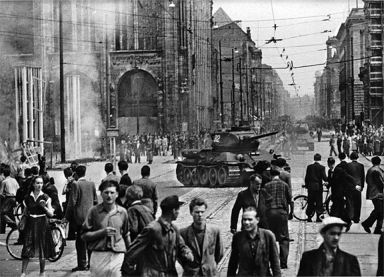Sixty years ago a group of construction workers in East Berlin walked off the job to protest a mandatory increase in production norms imposed by the East German government. Even without the Internet and social media, news of their action spread like wildfire throughout the German Democratic Republic. The next day, June 17, 1953 workers throughout the country engaged in wildcat strikes. In East Berlin the crowd of disgruntled workers and other antigovernment dissidents had
grown to between 30,000 and 50,000. Leaders of the protest issued a
call for a general strike, the resignation of the communist East German
government, and free elections. Soviet forces struck quickly and without
warning. Troops, supported by tanks and other armored vehicles, crashed
through the crowd of protesters. Some protesters tried to fight back,
but most fled before the onslaught. Red Cross officials in West Berlin
(where many of the wounded protesters fled) estimated the death toll at
between 15 and 20, and the number of wounded at more than 100. The
Soviet military commanders declared martial law, and by the evening of
June 17, the protests had been shattered and relative calm was restored.
The myth of the democratic "Worker and Peasant State" (Arbeiter-und-Bauern-Staat) was shattered once and for all.
I found a site that has archived digital copies all the GDR newspapers. Here is how the Stalinist propaganda organ Neues Deutschland reported the events of June 17, 1953:
Am Dienstag verursachten Gruppen von aus Westberlin eingeschleusten
Provokateuren Zwischenfälle im demokratischen Sektor von Berlin. Das
Ziel der Provokationen war. die durch die neuen großzügigen Maßnahmen
unserer Regierung (Erleichterungen im Vorkehr zwischen Ost und West,
Zulassung privater Industrie- und Handelsbetriebe usw.) angestrebte
Verständigung zwischen den Deutschen zu torpedieren. Die Agenten
bedienten sich dabei eines Teiles der Bauarbeiter, die sie zu einer
Demonstration veranlaßten.[…]Am Abend des Dienslag drangen große Gruppen faschistischer Jugendlicher
aus Westberlin in den demokratischen Sektor ein und versuchten vor
allem in der Stalinallee Zerstörungen anzurichten. Die Bevölkerung ging
gemeinsam mit der Volkspolizei gegen die Banditen vor und zerstreute
und vertrieb sie. Die Auffassung, daß man im demokratischen Sektor
ungestraft randalieren koenne. erwies sich als irrig.(On Tuesday a group of provocateurs who had been smuggled in from West Berlin instigated several incidens in Berlin's democratic sector. The goal of the provocation was to torpedo the attempts to increase understanding among all Germans – these generous attempts of our government include facilitating the traffic between east and west, allowing the establishment of private businesses, etc. The agents took advantage of a group of construction workers, engaging them in a demonstration.
Tuesday evening large groups of fascist youth from West Berlin forced their way into the democratic sector and attempted to wreak havoc and destruction in the Stalinallee. The population joined forces with the Peoples' Police and drove away the bandits. The idea that one could vandalize the democratic sector with impunity turned out to be false.)
Joachim Gauck, President of the Federal Republic, was 13 years old and living in Rostock when the events in Berlin unfolded. In a speech before the Bundestag Gauck recalls listening to the radio reports from West Berlin in a state of euphoria. He, along with millions of other East Germans, was convinced that things would be different – the people had spoken:
"Der 17. Juni war ein Volksaufstand für Demokratie und Recht." (June 17 was a popular uprising for democracy and justice).
President Gauck believes that the memory of June 17, 1952 should be celebrated much more robustly in German, that it is just as significant as the Prague Spring or the Polish Solidarnosc movement:
Aber die Tradition des 17. Juni zu würdigen, verlangt noch mehr. Es
gilt, auch heute überall auf der Welt denen beizustehen, die sich, –
obwohl diskriminiert und ausgegrenzt – mutig für Freiheit, Demokratie
und Recht einsetzen. Mögen diese Verteidiger von Freiheits- und
Menschenrechten auch zeitweilig unterliegen – so wie wir einst –, so
sind wir ihnen, mit denen wir unsere Werte teilen, Beistand schuldig.(But we should demand more in honoring the tradition of June 17. We are called to stand with people anywhere in the world who – although marginalize and discriminated against – have the courage to fight for freedom, democracy and justice. And even though they may = for the time being – be defeated in their defense for freedom and human rights – just as we once were – they share our values and we owe them our fullest support. )


